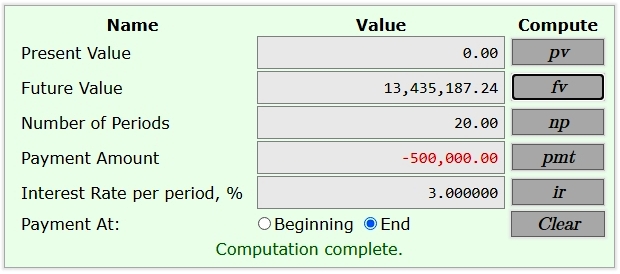SOLUTION: A local university is planning to invest $500,000 every 3 months in an investment which earns interest at the rate of 12 percent per year compounded quarterly. The first investment
Algebra.Com
Question 1173172: A local university is planning to invest $500,000 every 3 months in an investment which earns interest at the rate of 12 percent per year compounded quarterly. The first investment will be at the end of this current quarter.
(a) To what sum will the investment grow at the end of 5 years?
(b) How much interest will be earned during this period?
Answer by Theo(13342) (Show Source): You can put this solution on YOUR website!
using the financial calculator found at https://arachnoid.com/finance/index.html, make the following inputs:
pv = 0
fv = 0
pmt = -500,000
ir = 12% per year / 4 = 3
payment at end
click on fv to get:
fv = 13,435,187.24
here's a display of the results.

the interest earned on the account is the future value minus the sum of the payments = 13,435,187.24 minus 20 * 500,000 = 3,435.1872.24.
RELATED QUESTIONS
a local university is planning to invest $ 500,000 every 3 months in an investment which... (answered by ikleyn)
A local university is planning to invest $500,000 every 3 months in an investment which... (answered by CPhill)
A person wishes to deposit $5,000 per year in a savings account which earns interest of 8 (answered by ikleyn)
Susan invests R45 000 at a simple interest rate of 6% per year. Two years later, she adds (answered by )
Terry mother figures that she will need to have $200 000 at the end of 10 years. The... (answered by ikleyn)
Please help me with the homework:
A university student plans to buy a second hand car... (answered by math_tutor2020)
A sum of $2500, 000 earns interest at a rate of 12% per year compounded quarterly. How... (answered by ikleyn,solver91311)
$8,000 is invested for 9 months at an annual simple interest rate of 13%.
a) You will... (answered by greenestamps)
A company wants to deposit $500,000 per year in an investment which earns an interest of... (answered by Theo)
